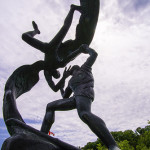We run our website the way we wished the whole internet worked: we provide high quality original content with no ads. We are funded solely by your direct support. Please consider supporting this project.
In the Wilderness of Religion
Eric Bryan via Compfight
There are an awful lot of us in the Church today who are no longer feeling at home in Evangelicalism. Regardless of how you feel about World Vision’s hiring policy decisions, the spectacle of thousands of people discontinuing their child sponsorships (relationships with flesh and blood children in need) because of a theological disagreement left many of us aghast. Is this what American consumerism has done to our faith?
Ed Cyzewski wrote a blog entitled We Know Where to Find Jesus, But What If We Don’t Want to Go There? If you’re feeling like you’re wandering in the wilderness of religion, it might comfort you to know that the wilderness can be a holy place.
From Ed’s blog post:
The riddle of Jesus was as confounding to John as it would be for us today. There’s no doubt that many Christians today would struggle to believe in and follow a religious “leader” like Jesus who wasn’t married, didn’t have a large following, and never assumed any kind of official office or put together an organization/denomination.
Jesus wasn’t organized, systematized, or influential according to our own terms. While he had a certain amount of authority and clout because of his powerful teachings and miracles, he never took on a formal position. That latter point made no sense to John.
I was reminded of these lessons about John from my book Unfollowers when I read a post by Sarah Bessey over the weekend. Sarah gives evangelicals “permission” to step away from labels, traditions, and positions for a season in order to grieve and to rediscover what following Jesus may look like for them. Everything in her post resonates with my own experiences in evangelicalism: the need to grieve its worst parts, the desire for distance and space, and the reassembling of my faith out in the wilderness apart from religious structures.
We don’t get to remake faith according to our own terms. We can only seek out Jesus wherever he may be found, and as the story of John the Baptist teaches us, Jesus spent a lot of time in the wilderness.
Category: General
Tags: Doubt, Ed Cyzewski, Evangelism, Faith, Jesus, Religion, Religious Idolatry, Sarah Bessey, World Vision
Related Reading

Do You Argue With God?
Image by michael_swan via Flickr In sharp contrast to many today who seek the comfortable feeling of certainty as a way of feeling at peace with God, biblical heroes are better known for their willingness to be uncomfortable and to honestly wrestle with God. Like Jacob who wrestled with God through the night (Gen 32), the heroes…

Imaging God Rightly: God’s Self-Portrait, Part 3
In the previous two blogs I noted that the vision of God in our minds is the single most important vision in our lives, for it completely determines whether we’ll have a relationship with God and what kind of relationship this will be. A. W. Tozer once wrote, “What comes into our minds when we…

Does the Doctrine of the Trinity Matter?
Jesus reveals the greatest, most beautiful, and mysterious aspect of God when he, despite being himself God Incarnate, relates to God as his “Father” and refers to God as “the Holy Spirit.” There is, of course, only one God (1 Cor 8:6). Yet Jesus reveals that God somehow exists as Father, Son and Holy Spirit.…

Sermon: Diaper Power
In this short clip from Greg Boyd’s Sermon Diaper Power, he introduces the theme of the sermon where talks about how the poverty of the manger exemplified the power of God. In this sermon, Greg shows that God really is like the baby swaddled in clothes in the manger. The kind of power that God…

The Incarnation: Paradox or Contradiction?
We’re in the process of flushing out the theology of the ReKnew Manifesto, and we’ve come to the point where we should address the Incarnation. This is the classical Christian doctrine that Jesus was fully God and fully human. Today I’ll simply argue for the logical coherence of this doctrine, viz. it does not involve…

The Cruciform Beauty of Horrific Divine Portraits
“Only a person who is aware of the crucified Christ can properly understand Scripture.” Luther (Table Talks) In the last three posts I’ve been wrestling with how insights from Matthew Bate’s book, The Hermeneutics of the Apostolic Proclamation might help us interpret violent portraits of God in the OT in a way that discloses how…

